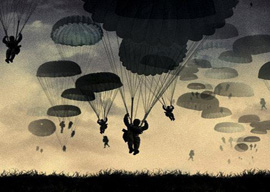
October 13, 2011

Probably that kind of bonding could, via military training, be created among any group of young males of any background, though I’d guess there would always be a few incorrigible misfits to be weeded out first. Following the remark I quoted above, Steven Pinker offers a quote from Marine-turned-author William Broyles’s book Brothers in Arms:
The enduring emotion of war, when everything else has faded, is comradeship. A comrade in war is a man you can trust with anything, because you trust him with your life.…It isn’t a particularly selective process, but a love that needs no reasons, that transcends race and personality and education….
The bonding comes much more easily when there are obvious and natural affinities, but I’d guess it can always be accomplished. Certainly there is a widespread desire to believe it can. Movie producers don’t get rich by showing us things we don’t want to see, and a lot of them have gotten very rich since WWII showing us combat platoons made up of a preppie, a farm boy from the heartland, a hillbilly, and a multiethnic seasoning of slum kids—Irish, Italian, and Puerto Rican.
The modern equivalent platoon would have to include a black, a Hispanic, a Muslim, an East Asian, an Indian (dot) and an Indian (feather), and a careful selection of non-Hispanic whites, perhaps differentiated by regional accent. At least one of them would have to be gay. (Transsexual? No, I don’t think we’re there yet. Oh, wait.…)
It is likely possible to bond a unit like that if the larger social milieu is supportive of the right ideals. It is, though, way harder than with a Pals Battalion; harder than just with an ethnically homogenous population from which to draw.
Our current social milieu is not supportive of the right ideals. I believe that under our reigning ideology of “diversity” and the culture of grievance and ethnic favoritism that goes along with it, this bonding is not possible.
There are some glaring instances in our present military culture when it plainly did not happen.
Exhibit A: The Fort Hood massacre.
Exhibit B: The Winchester atrocity.
And here’s a possible Exhibit C: Pvt. Danny Chen of New York City. I’ll emphasize “possible,” as we don’t yet know all the facts.
Pvt. Chen, age 19, died in Afghanistan on October 3rd. Usually a military death is reported with the cause of death, as here or here. Even when the cause of death is “non-hostile” there is as often as not some explanation given—“vehicle accident” being the commonest.
More than a week after Pvt. Chen’s death, however, its circumstances are unclear. The latest reports suggest suicide, although:
Family spokesman Frank Gee said [Chen’s parents] were also told by Army investigators that their only child had been subjected to taunting and violence at the hands of the soldiers with whom he served.
“Before he died he was harassed, and he was dragged out of the bed and actually beaten,” Mr. Gee said. “The Army volunteered that information to the family.”
Whatever happened there, it sure doesn’t sound like comradely bonding.
So is the “diversity” ideology a positive thing in our armed forces, as Gen. Casey claimed? Or is it, as everywhere else in our society, a divisive and destructive force—sowing rancor and discord, stifling trust, generating lawsuits, and making impossible what was once possible?